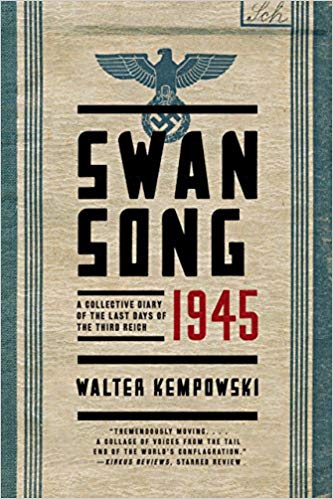
Swansong 1945
A Collective Diary of the Last Days of the Third Reich
کتاب های مرتبط
- اطلاعات
- نقد و بررسی
- دیدگاه کاربران
نقد و بررسی

February 23, 2015
Kempowski (1929–2007), a German novelist and historian, presents a riveting history of the final days of WWII from a predominantly German perspective. Formally, the work is a collage of personal experiences extracted primarily from diaries (of which 10 volumes exist, this being the fourth and the first in English translation), and it’s organized by date: four days in late April and May 1945. Hundreds of short diary excerpts relate a variety of experiences on each date, and Kempowski’s careful selection and sequencing convey the horror, misery, irony, and intensity of living through the last month of war in Germany. The work is noteworthy not just for its unique first-person perspective, but also for its breadth and depth: Hitler’s last moments in his bunker, Stalin’s daughter celebrating victory, the rape of German women by Russian soldiers and others, and the brutal conditions in the concentration camps. A general knowledge of European geography and the history of the fall of Germany in 1945 is assumed. Kempowski evenhandedly presents the Germans as both perpetrators and victims in this essential volume on the ravages of WWII.

February 15, 2015
Historians usually spend more time analyzing the origins, course, and consequences of war, rather than scrutinizing the moment when a conflict ends. German novelist Kempowski (d. 2007), who survived the chaotic last days of World War II himself, collates a variety of sources covering the period from Hitler's last birthday (April 20, 1945) through the final surrender (May 9, 1945) in order to document how people experienced the end of the conflagration. Kempowski gives voice not only to the powerful, such as Winston Churchill and Joseph Stalin, but people as diverse as a German refugee from Courland seeking to escape the advancing Red Army and the exhausted Allied soldiers who discovered the Bergen-Belsen concentration camp. While many of the sources are contemporaneous and as such provide unfiltered images of the war's end, others are postwar reflections. The latter are still important, but there is no editorial context explaining the types of material used. In addition, the casual reader may have trouble following some of the threads, for example Heinrich Himmler's efforts to conclude a separate peace. VERDICT Despite some reservations, these stories are often compelling and the book is recommended for public and academic libraries.--Frederic Krome, Univ. of Cincinnati Clermont Coll.
Copyright 2015 Library Journal, LLC Used with permission.

























دیدگاه کاربران